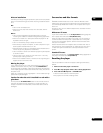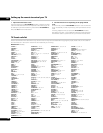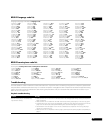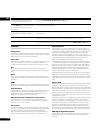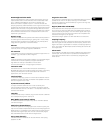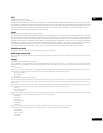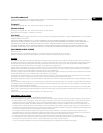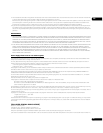
09
53
En
DTS-HD High Resolution Audio
DTS-HD High Resolution Audio provides sound quality which far
outpaces that of the current DVD discs with constant data rates
from 1.5 Mbps to 6.0 Mbps for Blu-ray Disc. DTS-HD High
Resolution Audio is capable of up to 7.1 channels of audio at a
sampling frequency of 96 kHz/24 bits so the original sound is finely
and faithfully reproduced with less disc space compared to DTS-HD
Master Audio. The result of using DTS-HD High Resolution Audio
use is especially significant when watching high definition video as
the sound that is clearer than ever creates the whole new movie
experience right at home.
Dynamic range
The difference between the quietest and loudest sounds possible in
an audio signal (without distorting or getting lost in noise). Dolby
Digital and DTS soundtracks are capable of a very wide dynamic
range, delivering dramatic cinema-like effects.
Ethernet
A frame-based computer networking technology for local area
networks (LANs). This player supports 100BASE-TX.
File extension
A tag added to the end of a filename to indicate the type of file. For
example, “.jpg” indicates an JPEG image file.
HDMI
HDMI (High-Definition Multimedia Interface) is a high-speed digital
interface which has the capability to support standard or
high-definition video plus standard to multi-channel
surround-sound audio on a single digital connection.
Interactive audio
Interactive audio is Linear PCM (LPCM) audio activated by a
BD-ROM application and mixed with the primary audio. It is typically
used to provide dynamic sounds associated with interactive
applications, such as button sounds.
Interlaced video
A method of displaying a picture in which odd-numbered lines are
updated in one pass, then even-numbered lines updated in the next.
See also Progressive scan video.
IP (Internet Protocol) address
A unique number that devices use in order to identify and
communicate with each other on a network utilizing the Internet
Protocol standard, such as ‘192.168.0.1’. No duplicate numbers are
allowed in the network.
LAN cable
A cable that has an 8-pin modular plug on each end and is different
from a telephone plug which has 4-pins.
MAC (Media Access Control) address
An address attached to the port of any device. The MAC address
cannot be changed.
PCM (Pulse Code Modulation)
A common system of encoding digital audio. Excellent quality, but
requires a lot of data compared to formats such as Dolby Digital and
MPEG audio. For compatibility with digital audio recorders and AV
amplifiers with digital inputs, this unit can convert Dolby Digital,
DTS and MPEG audio to PCM. See also Digital audio.
Pop-up menu (BD only)
A context-sensitive menu that can be used without interrupting
playback of a BD.
Progressive scan video
Also called non-interlaced video, this method of displaying a picture
updates all the lines in one pass, resulting in a more stable,
flicker-free image than interlaced video (for a given scanning rate).
See also Interlaced video.
Regions (DVD-Video and BD-ROM)
These associate discs and players with particular areas of the world.
This unit will only play discs that have a compatible region code (i.e.,
the same code as your player). You can find the region code of your
unit by looking on the rear panel. Some discs are compatible with
more than one region (or all regions).
Note that the region systems for DVD and BD are not the same.
Sampling frequency
The rate at which sound is measured to be turned into digital audio
data. The higher the rate, the better the sound quality, but the more
digital information is generated. For example, a sampling frequency
of 44.1 kHz means 44 100 samples (measurements) per second. See
also Digital audio.
Subnet mask
The IP address is divided into the network address part and the host
address part. The subnet mask is expressed as ‘255.255.255.0’. In
most cases, the subnet mask is automatically assigned by the
DHCP server.



